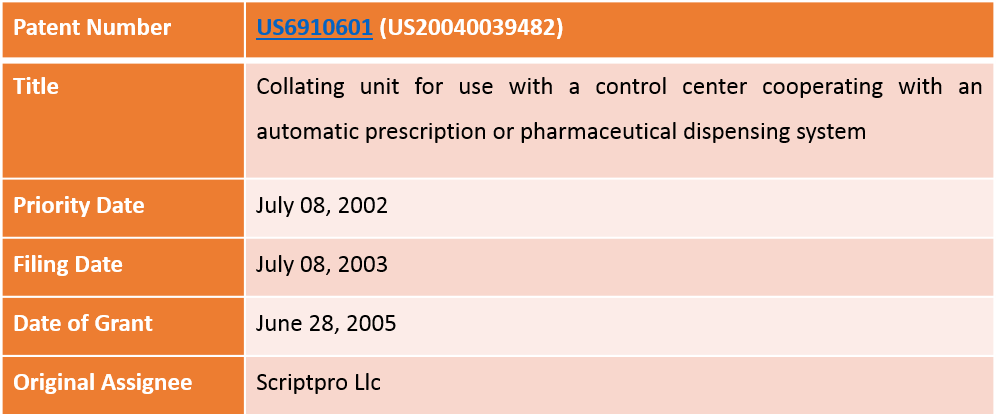 31st August, 2016 - 6:14 am
Categories:
News & Updates
patent infringement
Patent Litigation
Patents
31st August, 2016 - 6:14 am
Categories:
News & Updates
patent infringement
Patent Litigation
Patents
 0 Comments
0 Comments
This issue was handled by the United States Court of Appeals for the Federal Circuit in the SCRIPTPRO LLC, SCRIPTPRO USA, INC., Plaintiffs-Appellants v. INNOVATION ASSOCIATES, INC., Defendant-Appellee decided on August 15, 2016. This was an appeal from the United States District Court for the District of Kansas in No. 2:06-cv-02468-CM, Judge Carlos Murguia. United States District Court for the District of Kansas had granted summary judgment that claims 1, 2, 4, and 8 (“asserted claims”) of U.S. Patent No. 6,910,601 are invalid for lack of written description. This decision was appealed by ScriptPro, LLC and ScriptPro USA, Inc. (collectively “ScriptPro”).
Details of the patent at issue:
This patent relates to a collating unit operable to automatically store prescription containers dispensed from an automatic dispensing system for subsequent retrieval by an operator.
Parties agreed that claim 8 is representative of the asserted claims. Claim 8 has been reproduced below for the convenience:
Claims 8:
A collating unit for automatically storing prescription containers dispensed by an automatic
dispensing system, the collating unit comprising:
an infeed conveyor for transporting the containers from the automatic dispensing system
to the collating unit;
a collating unit conveyor positioned generally adjacent to the infeed conveyor;
a frame substantially surrounding and covering the infeed conveyor and the collating unit conveyor;
a plurality of holding areas formed within the frame for holding the containers;
a plurality of guide arms mounted between the infeed conveyor and the collating unit conveyor and operable to maneuver the containers from the infeed conveyor into the
plurality of holding areas; and
a control system for controlling operation of the infeed conveyor, the collating unit conveyor,
and the plurality of guide arms.
In 2006, ScriptPro had sued Innovation Associates, Inc. (“Innovation”) for patent infringement in 2006. After ScriptPro filed suit, Innovation petitioned for, and the United States Patent and Trademark Office (“PTO”) instituted, inter partes reexamination. During reexamination, ScriptPro amended the asserted claims, adding language to claims 1 and 2, and rewriting claim 4 into independent format. Claim 8 was not amended. District court granted summary judgment that the asserted claims are invalid for lack of written description. Details of the decision are: ScriptPro, LLC v. Innovation Assocs., Inc., 762 F.3d 1355, 1356 (Fed. Cir. 2014) (“ScriptPro I”). This decision was reversed by the federal circuit which held that district court erroneously determined that the specification limits the invention to a collating unit that requires use of sensors to determine whether a holding unit is full.
On remand, Innovation moved again for summary judgment that the asserted claims are invalid for lack of written description. In this second appeal, Innovation argued that the specification “unambiguously limits the manner in which the collating unit achieves automated storage of prescription containers . . . based on the availability of an open storage position and patient-identifying information” but the asserted claims “broadly claim a collating unit for ‘automatically storing’ absent any limitation that makes [them] commensurate with the invention” as described in the specification. In response, ScriptPro argued that the specification describes associating stored containers with a specific patient as one, but not the only, goal of the ’601 patent, such that the specification does not limit the claimed invention to sorting and storing based on patient-identifying information. The district court granted Innovation’s motion.
Federal circuit de novo reviewed the grant of summary judgement. In second appeal, ScriptPro argued that the district court erred by interpreting the ’601 patent’s specification as limited to sorting by patient-identifying information. The problem, according to ScriptPro, was that the district court’s focus on one purpose of the ’601 patent caused it to erroneously determine the scope of the invention. Federal circuit agreed with ScriptPro that the specification does not limit the claimed invention to sorting and storing prescription containers by patient-identifying information. The ’601 patent discloses multiple problems that the invention solves and many, of these solved problems involve sorting prescription containers by patient-identifying information, not all of them do.
Federal circuit agreed that as innovation argues, that much of the ’601 patent’s specification focuses on embodiments employing a sorting and storage scheme based on patient-identifying information. But a specification’s focus on one particular embodiment or purpose cannot limit the described invention where that specification expressly contemplates other embodiments or purposes. This is especially true in cases, where the originally filed claims are not limited to the embodiment or purpose that is the focus of the specification.
Federal Circuit reversed the decision of the court and remanded back the matter to the district court again with the costs to ScriptPro.
About the Author: Swapnil Patil, Patent Associate at Khurana & Khurana, Advocates and IP Attorneys and can be reached at: swapnil@khuranaandkhurana.com.


